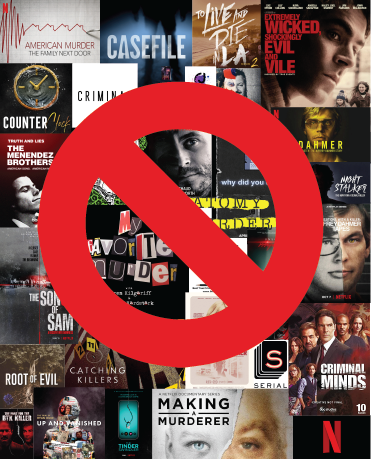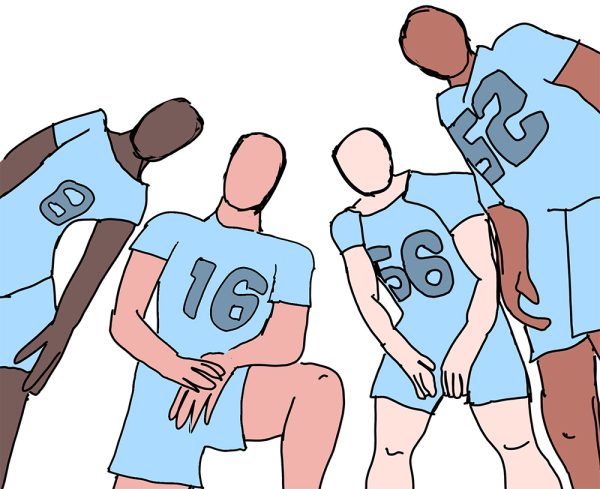True crime profits off of your sympathy

Photo Illustration by Opal Reeves
Content warning: This story contains discussions of serial killers, death, and sexual assault.
With the fandom of true crime online seemingly growing bigger by the day, documentaries, posts and podcasts about these subjects are dropped by the handful. With around 200 True Crime podcasts currently on iTunes, the genre has its own Top 20 list ranking the most successful podcasts currently streaming. These shows and podcasts though are often extremely dramatized or exaggerated.
While many fans would tell you they simply find these topics interesting, these interests can grow into bigger, more problematic issues if left to their own devices, like victims’ families not being consulted when telling the stories.
Producers like Ryan Murphy and Ian Brennan, the creators of Netflix’s new series “Dahmer – Monster: The Jeffrey Dahmer Story” have had no trouble adding to the pile of true crime media out there, with Murphy having helped produced “American Crime Story” and Brennan working on many horror shows like “The Watcher” and “Ratched”.
Rita Isbell, the sister of Errol Lindsey who was murdered by Jeffery Dahmer at 19, states in an article by The Hollywood Reporter about the Netflix docu-series, she feels like Netflix should’ve asked if she minded or how she felt about making it.
“They didn’t ask me anything. They just did it,” Lindsey said.
Isbell goes on to say, “I could even understand it if they gave some of the money to the victims’ children. The victims have children and grandchildren. If the show benefited them in some way, it wouldn’t feel so harsh and careless. It’s sad that they’re just making money off of this tragedy. That’s just greed.”
While Dahmer – Monster: The Jeffrey Dahmer Story is one of the more popular documentaries to come out in recent years, grossing over 42 million hours of watch time in its first week after release. These shows are released by the bunch, with at least 48 of these documentaries streaming on Netflix currently.
But Netflix isn’t the only perpetrator of this. Social media has become a hub for all things true crime. Hundreds of accounts and videos pop up every day to dramatize and over simplify these stories for young audiences. With accounts like “truecrime.memes” or “truecrimeandpizza” popping up left and right.
These accounts often tell the story of these murders as if they are charaters in a show not real people who deserve real consequences. Or they make horrible memes out of these situations. Very rarely can you find an account that appropriately handles the depth of the crimes in a respectful manner by doing proper research and not romanticizing these murders.
Romanticization happens when you sexualize Jeffrey Dahmer or other murders, it also can happen when you make light of murders by joking about it.
On the opposite side of the spectrum is Adrian Langenscheid, an author known for his books on true crime, and owner of True Crime International on Instagram. He does the best he can to “report the cases as a neutral observer.”
Langenscheid also said, “Even if my style seems very sober, I often sit in front of the screen with tears in my eyes.”
Langenscheid makes sure to keep himself grounded when reporting, he claims to ask himself: “How can it get to the point where people do violence to others? Where does evil come from? Could I continue to believe in God if something like this happened to me?”
Nicola Onnis, English and Intro to Education teacher, claims her interest in true crime is used as a form of escapism, and that her extent of fandom only goes as far as listening to podcasts and audiobooks.
In her words, it does feel like there is a problem with normalizing this content.
“There is a lot of curiosity for me about the human mind–but, to become highly interested in just one individual who is a serial killer? That feels akin to celebrating them and way too much,” Onnis said.
When we idolize murders by doing things like dressing up as them for Halloween or talking about how hot they are despite their crimes, we are downplaying the severity of their crimes and uplifting them to celebrity status. Serial killers, especially ones like Ted Bundy and Jeffrey Dahmer, do not deserve that sort of benevolent attention. They are murderers who don’t need sympathy.
This sympathy for Dahmer became increasingly more popular with the comic book, and later film, My Friend Dahmer, by John Backderf who was friends with Dahmer back in high school. The book does not glorify Dahmer, but it has painted him as some sort of victim, a product of his environment. It shows how tormented and bullied he is, and points to that as one of the reasons he turned out the way he did. It should be noted Backderf makes it clear that “Dahmer was a tragic figure, but that only applies up until the moment he kills.”
In an article on VICE by Marianne Eloise, she says, “Many who empathize with Dahmer tend to do so because of his shyness–because you could tell he was troubled just by looking at him.”
“[Dahmer] murdered 17 people–there are probably millions of lonely people out there who don’t do that,” said senior lecturer in Criminal Investigation at the University of Derby, Tony Blockley in the same article by Eloise.
“When you think about Dahmer, between 1978 and 1991, he was killing people. He said he was sorry, but is he actually sorry for the crimes, or is he sorry that he got caught?” said Blockley.
The only thing the Jeffrey Dahmer series on Netflix did right was to call him a monster in the title. By saying this it gave the correct impression about how terrible of a person Dahmer truly was. Nowadays with people’s growing sympathy for Dahmer it’s important to remember how much of a monster he truly was.
True crime profits off of tragedy and preys on people who feel the need to sympathize with these killers. We ask that you denounce these podcasts, criticize these “memes”, and make sure to think critically of the media you consume before assuming you know the whole story.
Jeffery Dahmer’s victims, and how old they were when they were murdered:
Steven Mark Hicks – 18
Steven Walter Tuomi – 24
James Edward Doxtator – 14
Richard Guerrero – 25
Anthony Lee Sears – 26
Raymond Lamont Smith/Ricky Beeks – 33
Edward Warren Smith – 28
Ernest Marquez Miller – 22
David Courtney Thomas – 23
Curtis Durrell Straughter – 17
Errol Lindsey – 19
Anthony Hughes – 31
Konerak Sinthasomphone – 14
Matt Clevland Turner – 20
Jeremiah Benjamin Weinberger – 23
Oliver Joseph Lacy – 23
Joseph Arthur Bradehoft – 25

Valentine Lindsey (he/him) is a senior who likes writing reviews on movies, shows, and games. You can often find him in dark corners of the school.
Maxson Peters (he/him) is a senior and is also the Managing Editor. He loves music, making comics, and hiking! You can find him light corners of the school because he is scared of the dark.






